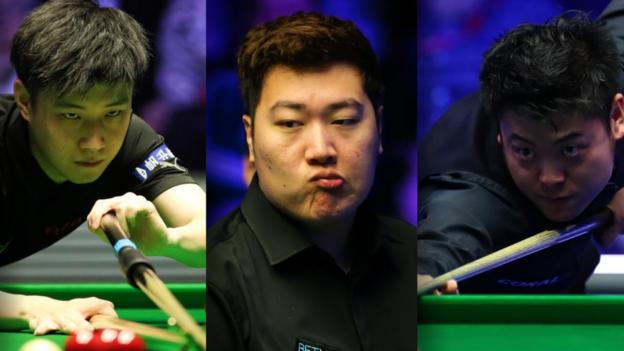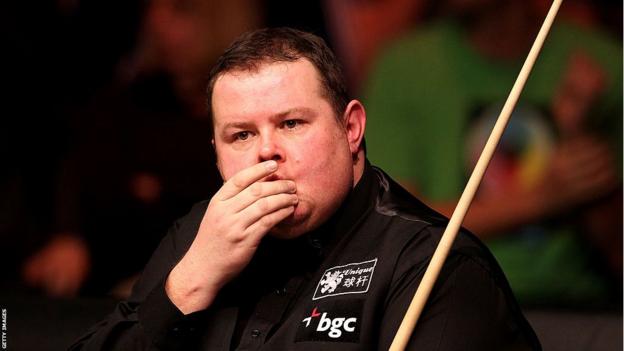[ad_1]

As snooker prepares to host one of its showpiece tournaments, the sport is in the midst of its biggest ever corruption investigation.
Ten Chinese players, including two that had been due to play in the Masters which starts on Sunday, have been suspended as part of the match-fixing inquiry.
A decision on whether charges will be brought is expected in the coming weeks.
So how did we get here? What happens next? And what does it mean for the sport?
What is the investigation about?
An investigation is looking into “allegations of manipulating the outcome of matches for betting purposes”.
It was started last year by the integrity unit at the World Professional Billiards and Snooker Association (WPBSA).
The sport monitors betting worldwide on snooker and gets alerts from the betting industry on suspicious activity.
In October 2022, Liang Wenbo was the first player suspended as part of the WPBSA investigation – over unspecified misconduct claims – and nine others have since been suspended.
Most of the players – several of whom were based in Sheffield – have not commented publicly on the allegations, although Wenbo has reportedly denied match-fixing.
What happens next?
The inquiry is described as being at “an advanced stage” and further suspensions are not anticipated, although the situation is fluid.
A decision must be made whether to bring charges against any or all of the players.
If there are charges, the cases will be heard by an independent panel, chaired by a member of the King’s Council (KC).
The panel will give verdicts and any sanctions, which players will have the right to appeal against.
In the interim, two suspended top-16 players will miss the Masters – former champion Yan Bingtao has been replaced by David Gilbert, while 2021 UK Championship winner Zhao Xintong’s spot has gone to Hossein Vafaei.
Cheats should be banned for life – Murphy
Speaking generally on the issue of match-fixing, former world champion Shaun Murphy said cheats should be banned for life.
“If players are found guilty of fixing the outcomes of matches, those players have no place in the game of snooker,” he told BBC Sport.
“If it were up to me, you would never see cheats again. Without that threat of never playing again, people behind match-fixers will always see an opportunity to exploit the game.
“Without the threat of a lifetime ban, I don’t see this problem going away.”
While life bans are the maximum penalty within snooker’s rules, enforcing them is complicated.
WPBSA chairman Jason Ferguson has said he believes such punishments could be challenged in court.
It is thought they would also limit the chances of people admitting offences, or providing further information.
Are there precedents?
In 2018, China’s Yu Delu was banned from snooker for 10 years and nine months after a major match-fixing inquiry.
His compatriot Cao Yupeng also pleaded guilty to fixing and was banned for six years, though three and a half years of his sentence were suspended.
In that case, 38 betting accounts using sophisticated computer software attempted to place a total of £250,000 in one second on the result of a Cao match.
The attempted coup, which could have netted a profit of £1m, failed after alarm bells rang with Asian-based bookies whose own computer programs raised suspicions.
This is not solely an issue with Chinese players. Englishman Stephen Lee – the former world number five – was banned for 12 years in 2013 after being found guilty of seven match-fixing charges.
Lee, who has always denied the offences, could potentially return in October next yea when his ban finishes, though he would then be aged 50 and would have to repay £125,000 in outstanding legal fees.

‘Sport must be clean and fair’
Snooker’s authorities insist anyone who attempts to fix matches, even just one, will be caught and is potentially throwing their career away.
“It’s obviously a very, very bad situation,” said 2005 world champion Murphy. “I suppose the only positive to take from this situation is the WPBSA has acted as swiftly as it could in trying to protect the integrity of the sport.”
While corruption allegations pose questions about how clean snooker is, officials believe taking a “zero-tolerance” approach serves as a warning to players.
“Obviously it’s not a great look but let’s not put that in the way of this great sport that goes all over the world,” Ferguson told BBC Essex last month as Bingtao was suspended as he prepared to play in the English Open.
“The sport is played in the best spirit 99.99% of the time.
“There are people behind the scenes in every sport trying to corrupt live sport all over the world, every day of the week. Every sport – whether that be football, cricket, tennis – have had issues.
“We will deal with it, we will bring it out into the open. Of course it’s a concern, and our job is to make sure it’s clean and fair.”
Snooker has also taken steps to help players lower down the ladder who might be struggling financially, and so might be potentially susceptible to fixing.
An advanced prize money scheme, introduced in October, means all 130 professionals on the World Snooker Tour are guaranteed minimum earnings of £20,000 for the 2022-23 season.
What about the future?
Commercial backers will need reassurances that any corruption is being eradicated.
“It’s not good – especially for sponsors, looking ahead into the future, wanting to get the big sponsors involved in the game,” said four-time world champion Mark Selby. “But World Snooker are doing all the right things.”
Murphy, meanwhile, said players were worried the investigation could have a knock-on effect for international tournaments restarting in China.
“The concern for us as a body of players is what effect this is having on re-establishing our events in China, which have been postponed since the Covid pandemic began three years ago,” he said.
“We are desperate for those events, which represent about a third of our income.”
China recently said quarantine for travellers would come to an end in January as they relax their strict Covid restrictions, and Ferguson is hopeful events can return there.
“Following the success of the Hong Kong Masters event in the summer, including a record crowd of 9,500, we were buoyed by the thoughts that the events in China would recommence,” added Murphy.
“Nobody can measure the damage the suspensions are doing to snooker around the world, and particularly in China, it’s not helping.”
Who are the 10 players?
Liang Wenbo – Age: 35 Ranking (Jan 2023): 56. Finalist in 2015 UK Championship and won English Open the following year. Before current suspension, was given a four-month ban in April 2022 after being convicted of domestic-related assault.
Lu Ning – Age: 29 Ranking: 46. Semi-finalist at the 2020 UK Championship and Championship League finalist last year.
Li Hang – Age: 32 Ranking: 64. Reached semi-finals of China Championship in 2017 and Scottish Open three years later.
Zhao Jianbo – Age 19: Highest-ranked amateur not to earn a Tour card at Q School in 2022.
Bai Langning – Age: 20. Ranking: 126. Regained his place on the pro tour by coming through Q School in 2022.
Chang Bingyu – Age: 20 Ranking: 77. Reached last 32 of the UK Championship in 2020.
Yan Bingtao – Age: 22 Ranking: 16. First player born in year 2000 to turn pro, regarded as one of game’s brightest prospects. Won the 2019 Riga Masters and 2021 Masters, World Championship quarter-finalist in 2022.
Chen Zifan – Age: 27. Ranking: 93. Made last 16 of the Riga Masters in 2019.
Zhao Xintong – Age: 25 Ranking: 9. Won 2021 UK Championship and 2022 German Masters.
Zhang Jiankang – Age: 24. Ranking: 82. Reached last 16 of British Open in 2021.
Sign up to My Sport to follow snooker news on the BBC app.


By Frank Keogh
Source link




